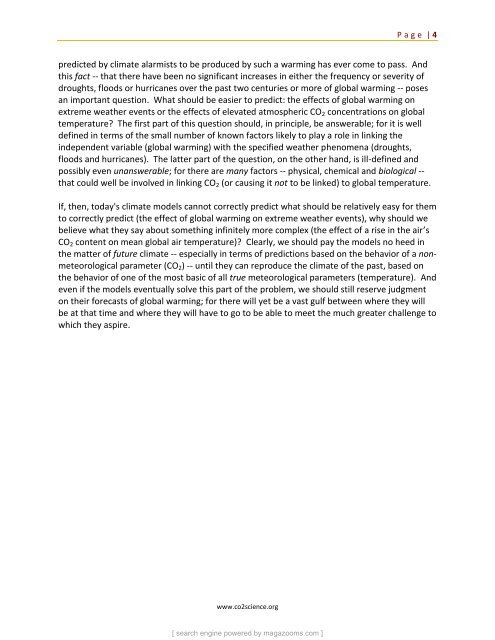Carbon Dioxide and Earth's Future Pursuing the ... - Magazooms
Carbon Dioxide and Earth's Future Pursuing the ... - Magazooms
Carbon Dioxide and Earth's Future Pursuing the ... - Magazooms
Create successful ePaper yourself
Turn your PDF publications into a flip-book with our unique Google optimized e-Paper software.
www.co2science.org<br />
P a g e | 4<br />
predicted by climate alarmists to be produced by such a warming has ever come to pass. And<br />
this fact -- that <strong>the</strong>re have been no significant increases in ei<strong>the</strong>r <strong>the</strong> frequency or severity of<br />
droughts, floods or hurricanes over <strong>the</strong> past two centuries or more of global warming -- poses<br />
an important question. What should be easier to predict: <strong>the</strong> effects of global warming on<br />
extreme wea<strong>the</strong>r events or <strong>the</strong> effects of elevated atmospheric CO2 concentrations on global<br />
temperature? The first part of this question should, in principle, be answerable; for it is well<br />
defined in terms of <strong>the</strong> small number of known factors likely to play a role in linking <strong>the</strong><br />
independent variable (global warming) with <strong>the</strong> specified wea<strong>the</strong>r phenomena (droughts,<br />
floods <strong>and</strong> hurricanes). The latter part of <strong>the</strong> question, on <strong>the</strong> o<strong>the</strong>r h<strong>and</strong>, is ill-defined <strong>and</strong><br />
possibly even unanswerable; for <strong>the</strong>re are many factors -- physical, chemical <strong>and</strong> biological --<br />
that could well be involved in linking CO2 (or causing it not to be linked) to global temperature.<br />
If, <strong>the</strong>n, today's climate models cannot correctly predict what should be relatively easy for <strong>the</strong>m<br />
to correctly predict (<strong>the</strong> effect of global warming on extreme wea<strong>the</strong>r events), why should we<br />
believe what <strong>the</strong>y say about something infinitely more complex (<strong>the</strong> effect of a rise in <strong>the</strong> air’s<br />
CO2 content on mean global air temperature)? Clearly, we should pay <strong>the</strong> models no heed in<br />
<strong>the</strong> matter of future climate -- especially in terms of predictions based on <strong>the</strong> behavior of a nonmeteorological<br />
parameter (CO2) -- until <strong>the</strong>y can reproduce <strong>the</strong> climate of <strong>the</strong> past, based on<br />
<strong>the</strong> behavior of one of <strong>the</strong> most basic of all true meteorological parameters (temperature). And<br />
even if <strong>the</strong> models eventually solve this part of <strong>the</strong> problem, we should still reserve judgment<br />
on <strong>the</strong>ir forecasts of global warming; for <strong>the</strong>re will yet be a vast gulf between where <strong>the</strong>y will<br />
be at that time <strong>and</strong> where <strong>the</strong>y will have to go to be able to meet <strong>the</strong> much greater challenge to<br />
which <strong>the</strong>y aspire.<br />
[ search engine powered by magazooms.com ]

















